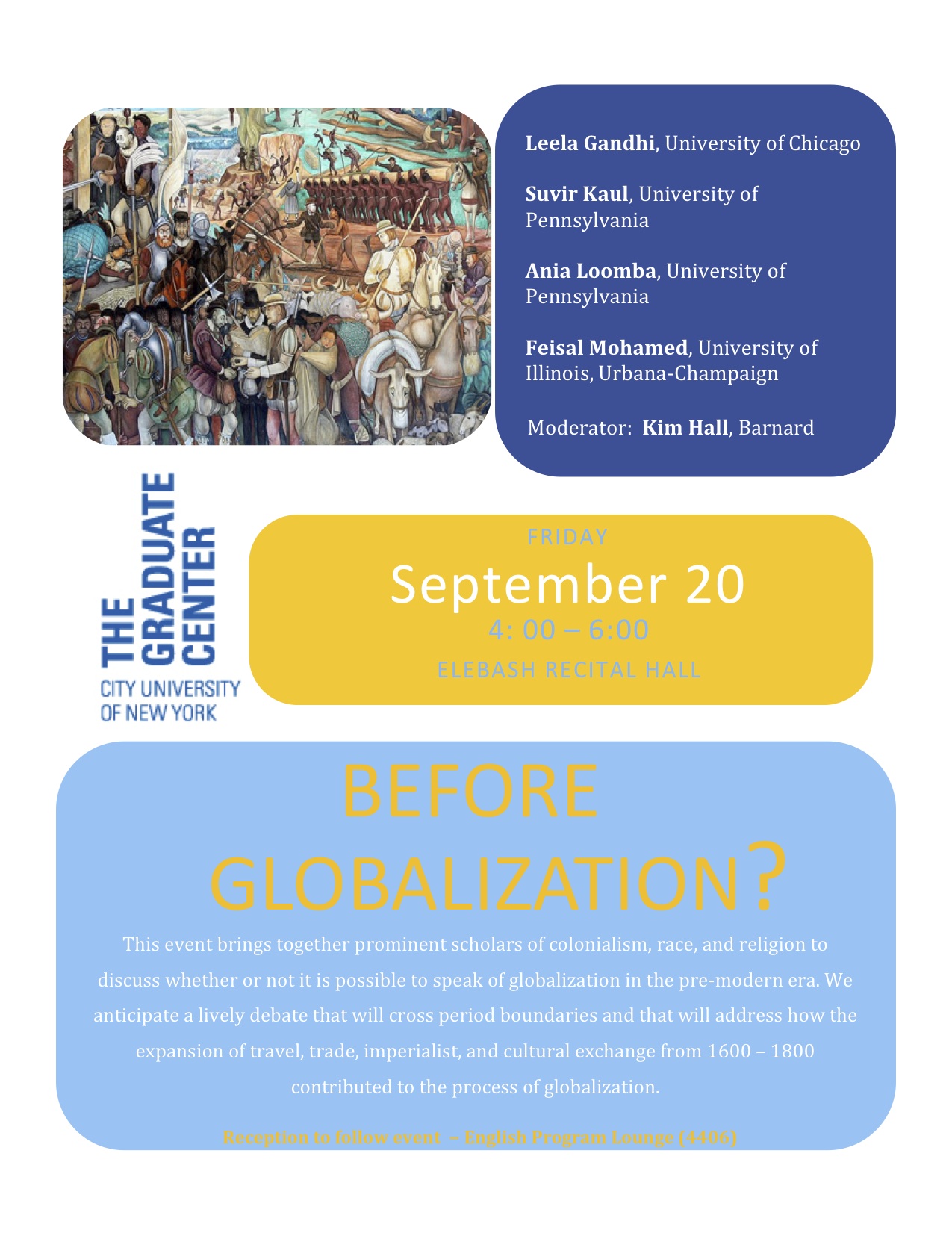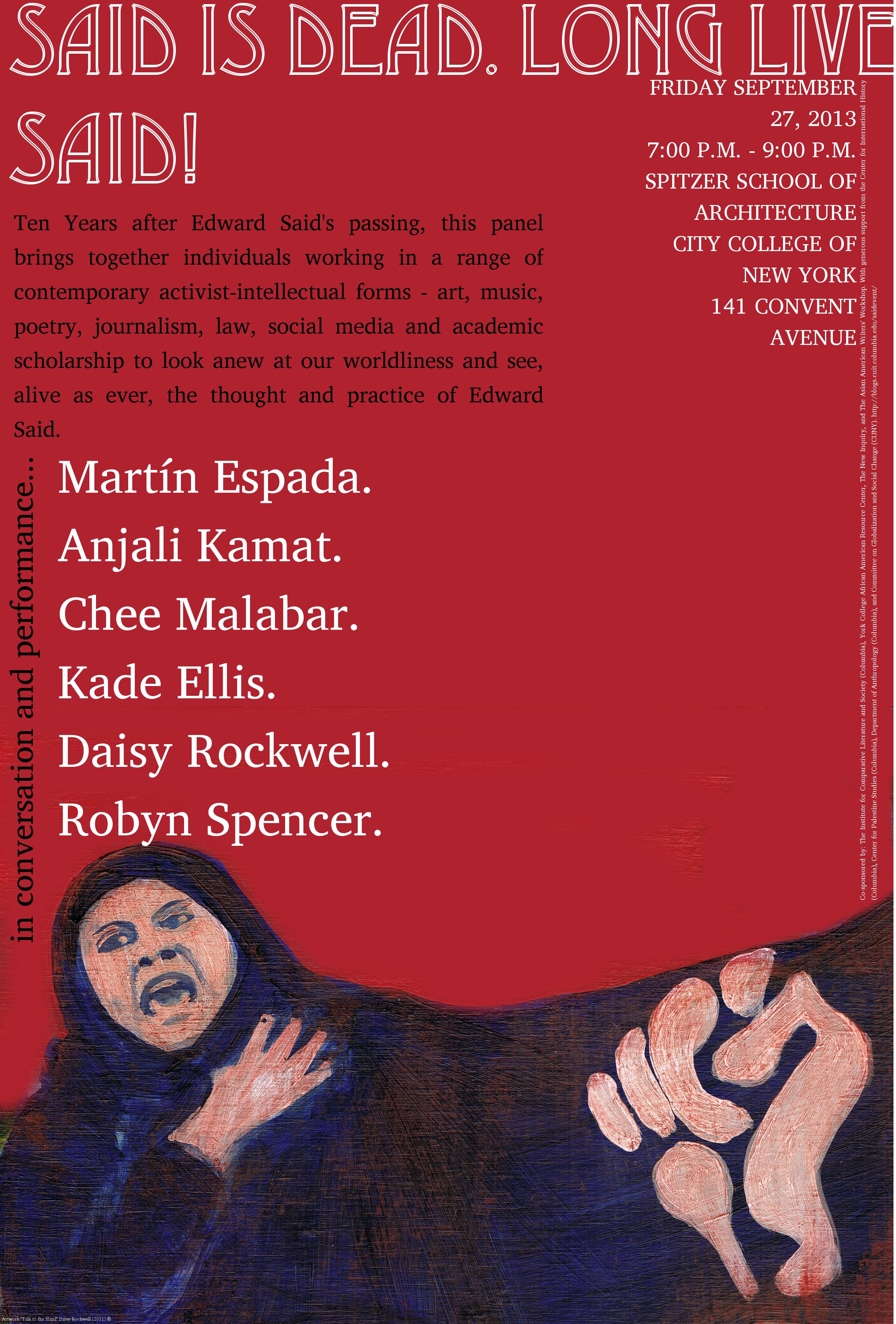April 25 and 26th, 2013: Contemporality: A Symposium on Politics, Time, and Thought
April 25, 2013 - April 26, 2013
4:30 pm - 6:30 pm
CUNY Graduate Center, Skylight Room
Keynote Address for Contemporality: A Symposium on Culture, Politics, and Time by David Scott, with presentations by Brian Goldstone, Harry Harootunian, Janet Roitman, Kristin Ross, Joan Scott, and Sara Pursley, with comments by Gary Wilder
Thursday, May 2: Strategies for social change: Movements with, within, against and/or beyond the State?
May 02, 2013
6:30 pm - 8:30 pm
Room 5307
he question of the relationship of social movements to the state is one of the most pressing of our time. The Occupy Movement, as well as those in Greece and Spain, organize around goals but often without specific demands on the state. Historical experience shows that the autonomy of social movements is necessary for social change. At the same time the state controls important resources, is in a more powerful position than the movements, and tends to try and control or repress them. How can this dilemma be approached beyond either a simple total rejection of the state or a cooptation of the movements? Can autonomy be constructed while with a relationship to the state?
September 13, 2013: Bodies, Histories, & Empire in Africa
September 13, 2013
10:00 am - 2:00 pm
CUNY Graduate Center, Skylight Room
Please join us at “Bodies, Histories, & Empire in Africa: Symposium” and welcome Professor Megan Vaughan—our newly arrived Distinguished Professor of History at the Graduate Center.
September 20, 2013: Before Globalization?
September 20, 2013
4:00 pm - 6:00 pm
CUNY Graduate Center, Elebash Recital Hall
Friday, September 27: Said is Dead. Long Live Said!
September 27, 2013
7:00 pm - 9:00 pm
Spitzer School of Architecture, City College of New York, CUNY
Said is Dead. Long Live Said!
Friday, September 27 | 7 PM – 9 PM
Spitzer School of Architecture, City College of New York, CUNY
141 Convent Avenue at 135th Street
Ten years after Edward Said’s passing, the financial and ideological crisis in higher education has caused the academy to increasingly retreat into itself. Ten years after Edward Said, it is difficult to find an academic who moves so seamlessly between world, text, and critique; who resists trenchant disciplinary specialization while insisting on the social responsibilities of scholars in an unequal world; who is as passionate a reader of the Western canon as a critic of its historic entanglements; who insists on reminding us, again and again, that knowledge and power cannot be thought apart. Said is dead, his loss is acute, and his absence tangible.
Yet we are also surrounded by a range of creative and forceful engagements with the world: the struggle for open access scholarship, online communities fighting for privacy and advocating for basic rights, innovative art that grapples with a world of war and terror. This panel brings together individuals working in a range of contemporary activist-intellectual forms – art, music, poetry, journalism, social media, and academic scholarship – to consider their own practice in relation to the legacy of Edward Said. It looks anew at our worldliness and sees, alive as ever, the thought and will of many who carry on the work of Edward Said in music, in words, and in actions.
Featuring:
Martín Espada (poetry)
Chee Malabar (music)
Kade Ellis (law/social media)
Anjali Kamat (journalism)
Daisy Rockwell (art)
Robyn Spencer (academia)
Moderated by: Manan Ahmed
Co-sponsored by the Institute for Comparative Literature and Society (Columbia), the York College African-American Resource Center (CUNY), The New Inquiry, and the Asian American Writers’ Workshop. With generous support from the Center for International History (Columbia), Center for Palestine Studies (Columbia), Department of Anthropology (Columbia), and Committee on Globalization and Social Change (CUNY).
For more information please visit http://blogs.cuit.columbia.edu/saidevent/
Wednesday October 09, 2013: Carbon Democracies? Politics, Money, and the Pursuit of Oil
October 09, 2013
6:30 pm - 8:30 pm
CUNY Graduate Center, Skylight Room
Carbon Democracies? Politics, Money, and the Pursuit of Oil
Anna Galkina is a research associate at Platform London.
May Boeve is the executive director and co-founder of 350.org, an organization that uses online campaigns, grassroots organizing, and mass public actions to solve the global climate crisis.
Friday October 25th: Bolivia’s Process of Social Change with Felix Muruchi Poma
October 25, 2013
4:00 pm - 6:00 pm
CUNY Graduate Center, Room 6112
Felix Muruchi Poma: Bolivia’s Process of Social Change
Felix Muruchi’s personal history as a miner, construction worker, student and union activist, nonprofit organization, political prisoner and later candidate, and most recently indigenous rights lawyer provides an extraordinary lens to grasp Bolivian struggles for social justice.
Friday October 25, 2013 | 4:00 to 6:00
Sociology Lounge, Room 6112
CUNY Graduate Center
365 Fifth Avenue
New York, NY 10016

Felix Muruchi Poma was born in a highland indigenous community in Bolivia where he herded llamas as a small child. When he was seven, his family moved to the Lllallagua tin mines so that his father could work underground. By the age of 16 Felix was engaged an illegal miner, before heading off to military service at 17 where he witnessed the first in Bolivia’s 18 years of military coups. He then joined the Siglo XX state mines rising to union leadership in the battle against military government repression and massacres. At 24, determined to study, he moved to Oruro where he supported himself working construction while attending the local university. He was an active student leader who was imprisoned and tortured after the Banzer dictatorship (1972-78) closed all universities. Captured and sent to Chile as part of Plan Condor, he organized a harrowing escape, finding sanctuary in the Dutch embassy in Santiago and exile in Holland. When Banzer fell, he returned to Bolivia’s mines but was forced into exile again when General Garcia Meza seized power in 1980. He returned to a democratic Bolivia in 1986 and founded an NGO in El Alto dedicated to training unemployed miners. He was active the fight to found a local university, where he subsequently became a student leader once again and was active in the 2003 Gas War.
In 2009, some thirty years after he first became a university student, he graduated as an attorney and is currently active in supporting his community of origin. He is co-author of two books, From the Mines to the Streets: a Bolivian activist’s life and Ponchos Rojos about an important highland indigenous social movement.
Praise for From the Mines to the Streets
This is quite possibly the best book about labor and political organizing in Latin America I ever have read. It is a real page-turner. —Frederic Hicks, University of Louisville
This book is a must read for gaining a deeper understanding of the country that is arguably undergoing the most interesting political – and citizen’s led – revolution in Latin America today. —Coletta Youngers Washington Office on Latin America
Of the six books and dozens of articles we read, the students overwhelming identified ‘From the Mines to the Streets’ as the course’s most engaging and interesting text. —Jason Tockman, University of British Columbia
Sponsored and Organized in collaboration with the Department of Sociology (Graduate Center, CUNY) and the Andean Information Network.
Friday, Nov 22nd 1pm: Heare Now Aimé Césaire! with Gary Wilder
November 22, 2013
12:00 am - 2:45 pm
Room C203
Join Gary Wilder as he explores Aimé Césaire’s distinctive critical orientation to politics, culture, and knowledge during the period of decolonization as he pursued projects that were at once situated and world-historical, realist and utopian, pragmatic and aesthetic, timely and untimely. The aim is to recognize Césaire as an innovative thinker of his time who can also speak directly to many of the political and theoretical predicaments of our times.
Wednesday, February 5th: Academics Writing Fiction: Ruth Behar and Paul Stoller in Conversation
February 05, 2014
6:30 pm - 8:00 pm
CUNY Graduate Center, Skylight Room
Anthropologists Ruth Behar and Paul Stoller consider the possibilities and place of fiction within the social sciences, and reflect on the kinds of creative and experimental writing that they and other academics have engaged in. The panel will be moderated by Sujatha Fernandes, Associate Professor of Sociology at CUNY.
Friday, February 7th: Imperial Debris: Roundtable with Ann Laura Stoler
February 07, 2014
1:30 pm - 4:00 pm
CUNY Graduate Center, Skylight Room
A Roundtable with Ann Laura Stoler on the publication of Imperial Debris: On Ruins and Ruination (Duke University Press, 2013). Stoler will be in conversation with Uday Mehta, Chelsea Shields, Neferti Tadiar, Megan Vaughan, Gary Wilder.















